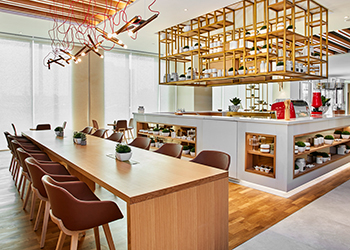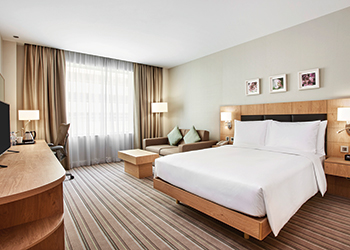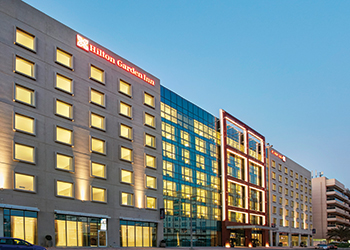Hilton Garden Inn Leeds with green credentials
01 June 2016
The UAE-based Majid Al Futtaim (MAF), the leading shopping mall, retail and leisure pioneer across the region, recently opened the doors of its first Leed (Leadership in Energy and Environmental Design) Gold hotel property in the UAE: The Hilton Garden Inn Mall of the Emirates.
Managed by Hilton Worldwide, the hotel located at the Mall of Emirates in Dubai has 370 guest rooms and is the second largest Hilton Garden Inn in the world with an area of around 21,000 sq m. Some 132 of these guest rooms are interconnecting – making the hotel ideal for families, groups and business travellers. The hotel features a range of guest amenities, including a health club, outdoor pool, business centre, and meeting spaces as well as a choice of restaurants and cafes.
Developed in 20 months, it was designed and constructed in line with world-class sustainability standards and is testament to the knowledge and expertise of Majid Al Futtaim in this area, says a top company official.
“Majid Al Futtaim is proud to set the regional benchmark for developing a truly sustainable building,” Simon Barlow, CEO of Hotels, Majid Al Futtaim Properties, tells Gulf Construction. “Through the use of environment-friendly materials and innovative design and construction techniques, we will continue to implement the highest sustainability standards in all of our future developments.”
A number of factors have been taken into account, key design features incorporated as well as construction and safety measures taken to make sure that the building conforms to the Leed requirements.
The architectural design of the Hilton Garden Inn Mall of the Emirates is based on brand guidelines that clearly set out design parameters for the building, and although minor modifications were made as a response to the site, the guidelines were maintained to ensure an instantly recognisable Hilton Garden Inn, says a spokesman for MAF.
 |
Barlow |
MAF worked with international engineering enterprise Laing O’Rourke to ensure that its construction approach reduced all possible risk and maximised safety. Time onsite was reduced and several components were manufactured and assembled off-site in a safe, controlled environment. Efforts were also made to reduce manufacturing times, thus enabling the delivery of the project in a short time frame.
Modular off-site construction has enabled a faster construction duration with less time on site, resulting with lower disturbance to the neighbourhood; it has resulted in less waste, higher quality, better control of materials and a better working environment for personnel; and reduced transportation requirements for staff, he says.
By reducing the levels of construction and labour on site, MAF was able to minimise high-level risk activities including working at heights and using leading edge protection. A number of initiatives were taken to reduce multi-trade workfronts in confined spaces, construction deliveries and number of people working on site, thus minimising disruption to the local environment. The focus was also on generating less waste on site, resulting in less disruption and noise and dust pollution to neighbours.
“The project team fully embraced an innovative approach to construction techniques to ensure the project was successfully delivered under the client’s stringent sustainability requirements. Innovative ideas were implemented throughout the entire project lifecycle. These include the use of a precast concrete frame, prefabricated bathroom pods, and 3D Oculus goggles to view pods prior to fabrication,” the spokesman explains.
To enhance the building’s sustainability, the structure comprises an in-situ concrete frame basement to Level One transfer structure; and a precast concrete frame extending from Level One to the roof, which is equal to 70 per cent of the gross floor area (GFA). Some 392 prefabricated bathroom modules were manufactured in double room configuration and some 2,750 items were manufactured and preassembled in Laing O’Rourke’s joinery factory. Also the prefabricated ductwork modules, which have been quality assured, also include Leed Gold deep cleaning requirements.
 |
The hotel offers a choice of restaurants. |
In addition, materials such as rebar, timber, concrete, concrete blocks, gypsum board, paving tiles and paints were selected and sourced with advice from and approval of Leed consultants, based on the ability to deliver minimal impact on the environment.
Furthermore, the Hilton Garden Inn Mall of the Emirates’ design was carried out in a digital engineering environment that was fully embraced by the design consultants and Laing O’Rourke’s manufacturing businesses.
“The use of building information modelling (BIM) was key to the coordination of the design and detailed construction modelling. In addition, this was used for sequencing deliveries, installation for precast concrete, bathroom pods and mechanical, electrical and plumbing (MEP) prefabricated modules,” the spokesman says.
The Hilton Garden Inn Mall of the Emirates is committed to the sustainability agenda throughout the lifecycle of the project, he adds. Under Leed Gold requirements, a waste management plan was fully adhered to, which ensured that pollution from construction activities was carefully managed. The plan included monthly waste management reports reviewed by the consultants, photographic evidence, and audited checklists. The project was periodically audited as continuing assessment for FS 36714, ISO 9001:2008 certification.
MAF also has a sustainability plan in place for the hotel in operation. Following strict Leed Gold guidelines, the Hilton Garden Inn Mall of the Emirates has facilities that reduce its environmental impact. Domestic water consumption has been reduced by 30 per cent through the use of high-efficiency plumbing fixtures and treating grey water onsite for re-use in air-conditioning cooling towers. The use of high-insulated walls and roofs, high-efficiency water-cooled chillers, automation for lighting and HVAC (heating, ventilation and air-conditioning) and energy recovery units for ventilation has resulted in 28 per cent savings in energy use. Also, the use of solar thermal collectors/hot water panels has resulted in 40 per cent savings in energy required to heat water. In addition, waste recycling initiatives are being taken to reduce operational waste by 40 per cent and a high-performance green cleaning programme by the hotel supports the use of environment-friendly products and maintains a high level of indoor air quality.
Other aspects that enhance the buildings “green” credentials include water flow restrictors for wash hand basins; the use of energy-efficient LED (light-emitting diode) lamps throughout the building; roof tiles with 78 per cent solar reflective to improve thermal performance; the installation of carbon dioxide (CO2) sensors in densely occupied areas to maintain indoor air quality; and sophisticated energy and water sub-metering equipment and fully automated building management system that will help in continuous commissioning.
 |
The Queen guestroom at Hilton Garden Inn. |
In addition, the hotel features facilities that will promote sustainability including reserved parking for low emitting hybrid/electrical cars and secure bicycle racks.
“It is estimated that sustainability initiatives being implemented by the Hilton Garden Inn Mall of the Emirates will reduce harmful CO2 emissions by 665 tonnes per year,” says the spokesman.
In addition to complying with Leed requirements, he says the project team participated in sustainability-focused activities under the LOR ‘EPIC (Environment, People, Industry, Community) philosophy. These activities included tree plantation, focus on recycling and waste minimisation, encouraging staff to use public transportation (metro, bus, etc), community activities including beach clean-ups, supporting local animal rescue centres, staff support with reading lessons in local schools, and clothes collection.
And last but not the least, MAF’s commitment to worker welfare was also demonstrated during the project.
“Workers on the project were given the opportunity to attend intellectual sessions in the evening, receive English language classes, and fly home annually (in lieu of the industry standard of every two years),” concludes the spokesman.
- Masdar City green footprint to expand
- Hilton Garden Inn Leeds with green credentials
- Effective insulation key to environmental gains
- Kingspan uses blowing agent with zero ODP
- Unigulf promotes Oriform’s benefits
- Bahrain working on 40 ‘green’ building projects
- Magic Dow fluid captures solar energy



